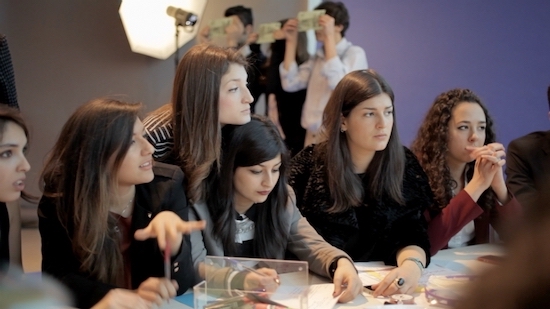“What would it mean if subjects were formed differently?” Adelita Husni-Bey asks over a glitching Skype connection. The Milanese artist, who represented Italy at the 57th Venice Biennale in 2017, was supposed to be here with us on the top floor of Bergen Kunsthall, but the pandemic had other ideas. As I write this, a little under a week later, the Kunsthall itself is now closed until at least mid-April, leaving Husni-Bey’s exhibition on the ground floor, originally intended to run until March 22nd and feature the participation of Husni-Bey herself leading a series of workshops with local students, facing an uncertain future. It would be a shame, however, if this fascinating work were to be overshadowed by the slowly elongating shadows of the first great plague of the twenty-first century.
Her (2015) film Agency repeats the notorious Stanford Prison Experiment conducted by psychology professor Philip Zimbardo in 1971, albeit with students playing the roles of politicians, bankers, workers, activists, and journalists instead of jailers and the jailed. The results, however, are frighteningly similar.
The game, taking place over three days at Manara High School in Rome, starts the day before an election with an 8.5 scale earthquake wiping out Lazio. Nonetheless, the student participants start off wide-eyed and idealistic, forming unions and alliances, speaking of reforms and problem-solving, and determined to serve the people.
Within an hour, half the activist group are on strike. The other half have set up a right wing nationalist party, hurling accusations of “fascism” at the politicians’ group. This new National Front then promptly win the elections and the once-eager opposition politicians immediately abandon all their idealistic talk of reforms in favour of a dramatic swing rightwards. Some of the students form a terrorist group and kidnap one of the newly-elected politicians at gunpoint. A new populist party is formed – named ‘Five Oranges’ after, presumably, a mix of Beppe Grillo and Sergei Prokofiev. The bankers admit to buying the election. A new military police force is formed, habeus corpus suspended, and suspected terrorists are locked up without trial. The politicians speak, familiarly, of “a moment of great crisis”. Allegations of corruption fly off in every direction.
The film ends with the students staring wistfully out of the classroom window at the buildings and the city beyond, an ominous grey sky hanging over everything. They ruefully conclude that they have failed to create a true democracy, merely an oligopoly where power was held by a select few “–and with a stock exchange,” they sigh, “it would be even worse.”
“In this society,” one student shrugs fatalistically, “which is similar to our society, power is obtained by playing dirty.”
It’s easy enough to make the same criticisms of Husni-Bey’s experiment as Zimbardo’s original. It’s artificial, unethical, and unscientific, leading the participants to play up to the roles expected of them. But this would be to misunderstand the artist’s intentions. She is not looking to prove some point about situational validation and group identity. The game is presented, rather, as an exercise in “radical education”.
“Schooling is the longest and largest compulsory experience that we’re all subjected to,” she says over that stuttering video chat from her Italian isolation. She points out that “schools are the sites of preparation to be efficient workers” and historically “compulsory schooling emerged around a time of major social upheaval in the 1870s,” with the first unions being formed in the States and Chartist revolts gaining ground in the UK.
Husni-Bey’s interest is in alternatives to that – things like the Zapatista schools in Mexico in the early 00s; Peter Kropotkin’s theories of “integral education” with its refusal to distinguish between manual and intellectual labour; the Modern School, where education and activism combined in early twentieth century New York; and the hands-on, non-dogmatic teaching styles practised at French ‘écoles ouvertes’ since the 1960s, a sort of loophole in the education system that made space for alternative approaches.
It was at one such Parisian school that Husni-Bey made the (2011) film, Postcards from the Desert Island. Inspired by William Golding’s novel Lord of the Flies, a book which Husni-Bey claims “establishes the myth that children cannot function without authority”, she invited a group of pupils at the École Vitruve to imagine themselves on a desert island, in order “to find out what it would look like for children who are brought up differently to find a different ending.” The results are by turns charming and disarming, but perhaps the strangest thing about it is the degree to which these kids carefully and patiently set out to reconstruct almost every aspect of contemporary capitalist society, from the market to the penal system to the division between public and private life.
In the work of Adelita Husni-Bey radical theatre, pedagogy, and social experiment combine and intermingle in surprising and unpredictable ways, resulting in works that are often funny and always thought-provoking. But the point is not always to get results, demonstrate some thesis, or extract re-usable value – almost the reverse, in fact. Talking to the twenty-off assembled visitors to Bergen Kunsthall down the wire from Milan, in reference to another of her works, in which a group of American immigration lawyers are asked to act out exercises from Augusto Boal’s Theatre of the Oppressed, she asks, “What does it mean to fail together?” A query that could prove to be the defining question of our age.


